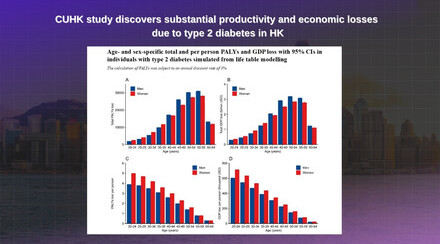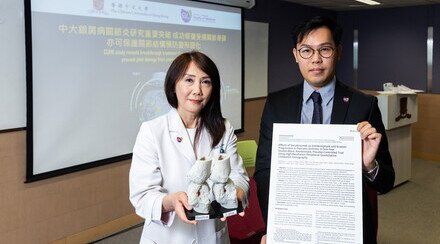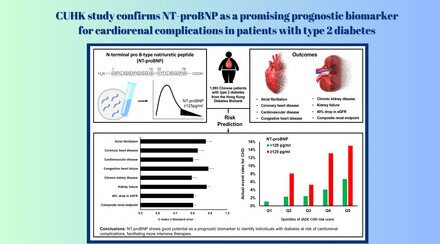CUHK study supports continuation of renin-angiotensin system inhibitors (RASi) in patients with type 2 diabetes and advanced chronic kidney disease to reduce major cardiorenal complications
Diabetes is a common cause of chronic kidney failure, accounting for 50% of patients on dialysis. Renin-angiotensin system inhibitors (RASi) are commonly used in the treatment of hypertension. They are effective in reducing the risks of proteinuria, inflammation, and multiple organ damage in patients with diabetes. However, one of the side effects of RASi is an increased risk of hyperkalemia (high potassium) which has led to a debate regarding the risk versus benefits of RASi continuation in advanced chronic kidney disease.
Researchers from The Chinese University of Hong Kong (CUHK)’s Faculty of Medicine (CU Medicine) followed 10,400 patients with type 2 diabetes treated with RASi and evaluated the risks of major adverse cardiovascular events, end-stage kidney disease, heart failure and death among those who discontinued RASi. The results found that discontinuation of RASi can increase the risks of cardiorenal complications. These findings have been published in the leading peer-reviewed journal eClinicalMedicine under the international journal The Lancet.

Researchers from CU Medicine evaluated data of 10,400 patients with type 2 diabetes treated with RASi, finding that discontinuation of RASi can increase the risks of cardiorenal complications. (From left) Assistant Professor Dr Elaine Chow, Research Assistant Professor Dr Aimin Yang from CU Medicine’s Department of Medicine and Therapeutics and Professor Juliana Chan, Chair Professor of Medicine and Therapeutics at CUHK.
Discontinuation of RASi increases risks of end-stage kidney disease, major adverse cardiovascular events and heart failure
Diabetes is a leading cause of heart disease, stroke, and kidney failure in Hong Kong and worldwide. CU Medicine researchers have been tracking the trends of kidney outcomes in people with diabetes over the past three decades. One recent study revealed one in six patients with diabetes experienced rapid decline in kidney function. About 10% of patients with diabetes have advanced chronic kidney disease, where filtration function is less than 30% (estimated glomerular filtration rate [eGFR] <30 ml/min/1.73m2). These patients are at high risk of progressing to end-stage kidney disease needing dialysis.
Researchers from the Division of Clinical Pharmacology and Division of Endocrinology and Diabetes examined outcomes in 10,400 patients with type 2 diabetes and advanced chronic kidney disease treated with RASi between 2002 and 2018 from the Hong Kong Diabetes Surveillance Database (HKDSD). The team examined the risks of major adverse cardiovascular events, end-stage kidney disease, heart failure and death among those who discontinued RASi versus those who continued with it within six months upon their kidney disease progressing to an advanced stage, that is their eGFR reaching <30 ml/min/1.73m2. The study included 1766 users who discontinued RASi versus 8634 users who continued with RASi, with a median follow up of 3.6 years. Results showed that compared with RASi continuation, discontinuation was associated with 30% increased risk of end-stage kidney disease, 27% increased risk of major adverse cardiovascular events, 85% increased risk of heart failure but no difference in all-cause mortality.
Dr Aimin Yang, lead author of the paper and Research Assistant Professor of CU Medicine’s Department of Medicine and Therapeutics said, “Our results complement a recently published randomised controlled trial in The New England Journal of Medicine that included 411 patients with advanced kidney disease with and without diabetes. In that study, although the decline in kidney function was similar, there were numerically more patients in the RASi discontinuation group who developed end-stage kidney disease and cardiovascular events than those who continued RASi.”
RASi showed no obvious link to risk of hyperkalemia in patients with diabetes and advanced chronic kidney disease
The kidney is the key organ that regulates levels of essential substances, such as potassium, in the blood stream for optimal bodily functioning. People with advanced kidney disease cannot excrete potassium effectively, which leads to high potassium levels.
RASi are effective in reducing the risks of proteinuria, inflammation, and multiple organ damage in patients with diabetes but one of the side effects is increased risk of hyperkalemia. In real-world practice, 15% to 30% of patients with advanced chronic kidney disease had discontinued RASi due to concerns of hyperkalemia or acute decline in kidney function.
In a subgroup analysis of 583 patients who discontinued RASi and 3,817 who persisted with RASi upon experiencing advanced kidney failure, the cumulative risk of high potassium levels (>5.5 mmol/L) was similar between both groups over a 5-year period. The risks of hyperkalemia were only apparent at a higher dosage of RASi.
Dr Elaine Chow, the lead senior author of the paper and Assistant Professor in CU Medicine’s Department of Medicine and Therapeutics explained, “RASi was often discontinued for various reasons in patients with chronic kidney disease, and not restarted. In fact, by avoiding drugs that can compromise kidney function, moderating dietary potassium intake and measuring kidney function regularly, many patients with chronic kidney disease can safely continue and benefit from RASi. International guidelines recommend monitoring of kidney function and potassium levels, particularly within 2-4 weeks of drug initiation. The dose of RASi can be adjusted based on kidney function and potassium levels, with discontinuation only as a last resort.”
Professor Juliana Chan, Chair Professor of Medicine and Therapeutics at CUHK concluded, “Our findings support continuation of RASi in patients with diabetes and advanced chronic kidney disease. These drugs can protect not only the kidneys, but also reduce other cardiovascular outcomes such as stroke and heart attack. The key message is to address multiple risk factors such as high blood glucose, high blood cholesterol, high blood pressure, overweight and smoking. The use of new agents like sodium glucose co-transporter 2 inhibitors (SGLT2i) and/or glucagon-like peptide 1 receptor-agonists (GLP1-RA) on top of RASi use can confer major cardiorenal benefits. To this end, professional and patient education on prevention and monitoring can go a long way in reducing the growing burden of diabetes on our healthcare system.”
The study was supported by the CUHK Impact Research Fellowship Scheme, and other funding support.
References
1. Yang A, Shi M, Lau ESH, Wu H, Zhang X, Fan B, Kong APS, Luk AOY, Ma RCW, Chan JCN, Chow E. Clinical outcomes following discontinuation of renin-angiotensin-system inhibitors in patients with type 2 diabetes and advanced chronic kidney disease: a prospective cohort study, eClinicalMedicine, 2022
2. Bhandari S, et all, & STOP ACEi Trial Investigators, Renin-Angiotensin System Inhibition in Advanced Chronic Kidney Disease. The New England Journal of Medicine, 2022, https://doi.org/10.1056/NEJMoa2210639
3. https://www.hsph.harvard.edu/nutritionsource/potassium/
4. KDIGO, 2022 Clinical Practice Guideline for Diabetes Management in Chronic Kidney Disease. Kidney International, volume 102, issue 5S, November 2022





































































































